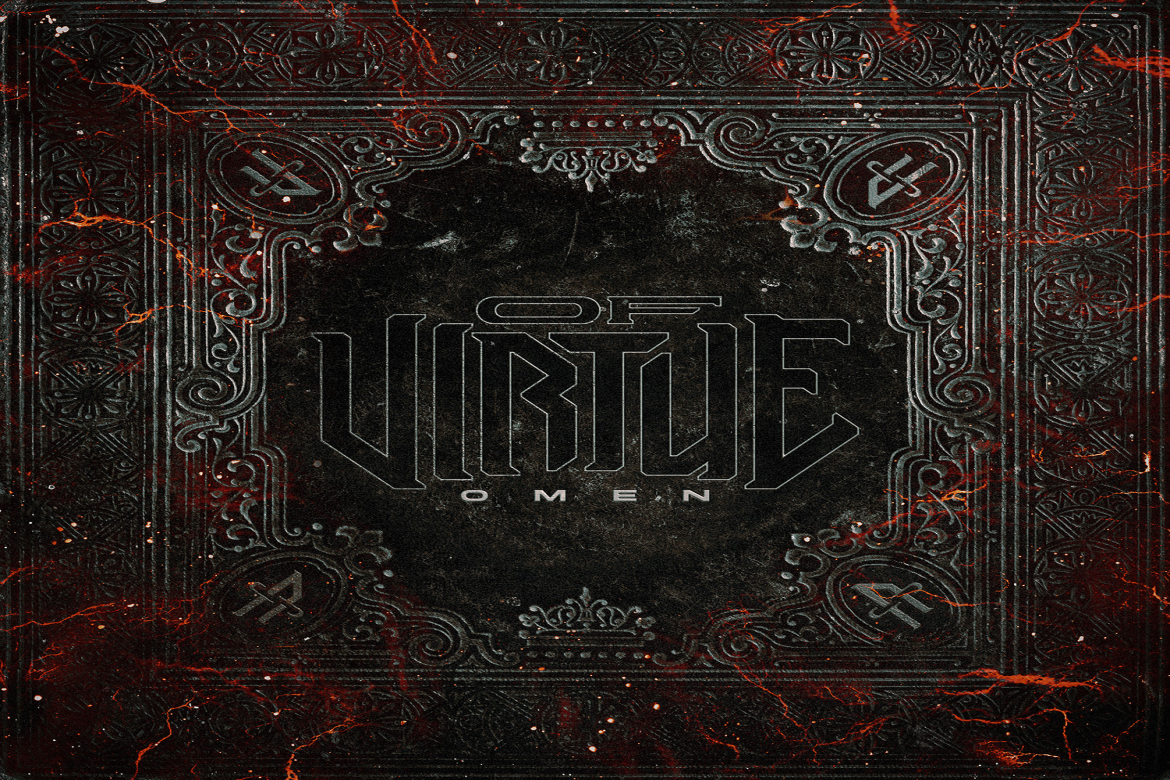“Make me forget all the ways that you hated me.”
Founded in 2008, Michigan’s Of Virtue have enjoyed a lengthy tenure in the metalcore scene. With quite a substantial discography, a steady audience, and having performed all over the world, the band have definitely tasted success. On their latest studio album, Omen, they look to continue in the mindset of growth, poised to deliver from the years of accumulated experience. The production and mixing credits on this album are extensive, including but not limited to Lee Albrecht (Hollow Front, The Wise Man’s Fear), Carson Slovak and Grant McFarland of Atrium Audio (ERRA, Like Moths To Flames), and Dan Braunstein (Spiritbox, Invent Animate).
When we covered their recent EP, Sinner, on the site, the conclusion drawn was ultimately that, whilst a more polished and coherent sound for the band, the release lacked ambition and identity. With three of the EP’s songs included on Omen’s tracklist, the hope is that Of Virtue have managed to hone in on a more developed sound for themselves on the rest of the album.
Album opener and title track “Omen” holds some promise. Massive riffs burst the band onto the stage, with vocoder vocals permeating the verses. The chorus is quite vibey, even if clearly derivative of the style of many accessible bands in today’s scene, and the track’s breakdown is simple yet effective, with satisfying bends giving much-neeeded depth. While not a mind-blowing track, it is sufficiently catchy.
Most of the aforementioned promise falls through after this, unfortunately. The derivative nature of “Omen” is emphasized even more with each following track. Many of the choruses seem to try to recreate the magic of Bad Omens’ recent work, but without any of the innovation. The band clings to the verse-chorus-breakdown structure almost parasitically, leaving each track predictable and lacking in excitement. The formula of sung verses and choruses with a fleeting moment of heaviness on the breakdown is one that has been crafted better a thousand times before.
The band do make an effort to introduce heavier moments at times, which is where the record shows signs of teeth. “A.N.X.I.E.T.Y.” sees the album have a taste of proper metalcore instrumentation, with its screamed verses and heavier instrumentation. I cannot help but recall “Burner” by Kingdom of Giants, however, which did the spelled-out anxiety chant in a far more enjoyable fashion. The track also continues to follow the same structure as before, just with a heavier finish. “True Colors” executes this concept much better, with the familiar style of Lee Albrecht taking charge on the riffs. It plays out relatively well, with enough variation to help the track stand by itself. However, the noticeable writing style of Albrecht here and on album closer “False Idols” begs the question: how much was really written by the band?
The ensuing pivot in the direction of heavy ballads does not help the album’s cause whatsoever; as if the album isn’t already overly reliant on genre tropes, the fully sung, weepy-sounding tracks do little to add to the variety of the album. “Floating” tries to increase its standing by featuring Rory Rodriguez of Dayseeker. It’s nearly impossible to make Rodriguez sound bad, and “Floating” thankfully fails to do that, but his presence here does almost nothing to improve the track or make it stand out. It offers such little of substance that his inclusion feels inconsequential, quite obviously slapped on for name recognition.
The album’s weakest point is arguably its lyricism. Of course, lyrics have not often been metalcore’s strongest selling point; melodramatic, self-deprecating lines both sung and screamed have been a staple of the scene. Most bands, however, are able to make up for this with sonic innovation, making their music enjoyable regardless of their lyrics. With most of Omen being musically uninspired and boring, the amateur, poorly-written lyrical content ends up unintentionally standing out. The songs range from mediocre to outright laughable, notably on tracks like “Cold Blooded” and “Cannibals” where the words are too edgy to be taken seriously. “I am the rage” and “Send me to hell with all the cannibals,” in particular, are accidentally hilarious. The majority of the album’s riveting songwriting includes rehashed tropes about strained relationships and religious symbolism.
Regrettably, a sense of identity is not what you will find on Omen. Holding onto the done-to-death sound of before and stretching it out to the runtime of a full-length, I fail to hear any meaningful growth. The album has its moments of creativity, fleeting as they are, and it’s not irredeemable. With how few and far between those instances are, they unfortunately feel like flukes more than anything. While Omen retains its digestible and serviceable nature, it offers nothing more, making for a completely forgettable album despite collaboration with some of the genre’s biggest names.
Admittedly, the album sounds well-crafted, but I attribute that mostly to the ensemble cast of producers. This overly polished sound only serves as a coat of fresh paint on a faulty car; a shiny, attractive looking vehicle that breaks down right before the highway, presenting the promise of a journey but stalling before it can begin. Though this safe approach may well bring commercial success, I hope that Of Virtue can identify the stronger elements of their sound and push forward with them for their next effort.
3.5/10
Omen releases on the 27th of October via Arising Empire, and pre-order links for the album can be found here.

